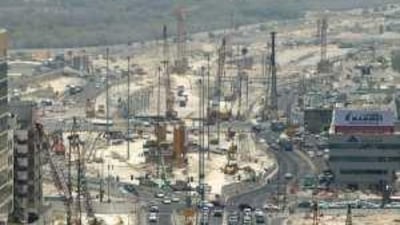ABU DHABI // Part of Salam Street has been closed to heavy vehicles as building continues on a three-level interchange that includes a bridge to Reem Island. Trucks travelling towards the Corniche and approaching the junction of Salam Street with Hazza bin Zayed Street are being diverted on to Reem Island before returning to Salam Street after the building zone. Those heading toward Maqta Bridge on Salam Street are being diverted to Fourth Street.
A height restriction of 4.8 metres at the junction was already being enforced by Abu Dhabi Municipality and Abu Dhabi Police. This month, police announced restrictions barring lorries and heavy vehicles weighing above 2.5 tonnes from entering the city, and from a section near Al Raha Beach, between 6am and 8am and between 1pm and 3pm. The municipality said it had distributed flyers at Adnoc petrol stations which included maps showing the alternative routes for heavy vehicles.
The interchange at Salam Street and Hazza bin Zayed Street, and another near the Sea Palace, are due for completion by April 2010. When the interchange at Salam and Hazza bin Zayed is finished, through traffic on Hazza bin Zayed Street will be carried over the junction on a four-lane, 230-metre bridge towards Reem Island. Through traffic on Salam Street will be able to travel along an eight-lane tunnel with capacity for more than 6,000 vehicles per hour, carrying on to the planned Sheikh Zayed Bridge without meeting a traffic light.
Local traffic will be controlled at ground level by a junction with lights. Work is taking place around the clock on the Dh5 billion (US$1.36bn) road project. mchung@thenational.ae

